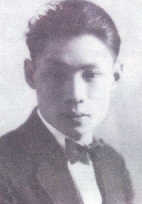 Xia Yan (1900-1995) had another name of Shen Naixi, with the alias Duanxuan and Duanxian. He was born into a declining family on the outskirts ofHangzhou,ZhejiangProvince onOct. 30th, 1900. His father died when he was only three years old and the life for the family became even harder. Anyway, Xia did not only like opera, but also the classic novels as well asTanci(storytelling inSuzhoudialect to the accompaniment of stringed instruments) in his childhood.
Xia Yan (1900-1995) had another name of Shen Naixi, with the alias Duanxuan and Duanxian. He was born into a declining family on the outskirts ofHangzhou,ZhejiangProvince onOct. 30th, 1900. His father died when he was only three years old and the life for the family became even harder. Anyway, Xia did not only like opera, but also the classic novels as well asTanci(storytelling inSuzhoudialect to the accompaniment of stringed instruments) in his childhood.
After graduation in 1920, Xia planned to study inFrance, but failed. One year later, he was recommended to a Japanese school by the provincial government to study electrical engineering. During his years abroad, Xia read a lot of philosophical as well as literary works and began to show his increasing interest in literature. Meanwhile, he also showed his interest in socialism and read some classic works likeCommunist Manifesto,through which he had a further understanding of scientific socialism. In the autumn of 1924, Xia met Sun Yat-Sen, by whose introduction he joined the Kuomintang (KMT) and did some propaganda work for the overseas organizations of the KMT.
Being among the wanted list of April 12th Coup, Xia was expelled by the Japanese government. He went back toShanghaiin the summer of the same year and immediately involved himself into the activities of the Communist Party, which declared his political breakup from the Right Wing of the KMT.
 In 1930, Xia participated in the launch of the China Left-Wing Writers League and was selected as a member of the committee. Later, he also took part in the launch of Chinese Dramatist Union. Under the leadership of Qu Qiubai, he wrote some screenplays. He was arrested by the KMT government in 1935, and for some time had to live in seclusion. He created some drama scripts likeUnder the Eaves ofShanghai.After the burst of the War of Resistance Against Japan, he, together with Guo Moruo, established a patriotic paper. Later he mainly engaged himself in journalism and drama scripts. He worked as an editor in newspaper offices inShanghai,Guangzhou,Guilin,Chongqing,Hong KongandSingapore, etc., and published a number of proses, satirical essays, political comments and drama scripts, etc.
In 1930, Xia participated in the launch of the China Left-Wing Writers League and was selected as a member of the committee. Later, he also took part in the launch of Chinese Dramatist Union. Under the leadership of Qu Qiubai, he wrote some screenplays. He was arrested by the KMT government in 1935, and for some time had to live in seclusion. He created some drama scripts likeUnder the Eaves ofShanghai.After the burst of the War of Resistance Against Japan, he, together with Guo Moruo, established a patriotic paper. Later he mainly engaged himself in journalism and drama scripts. He worked as an editor in newspaper offices inShanghai,Guangzhou,Guilin,Chongqing,Hong KongandSingapore, etc., and published a number of proses, satirical essays, political comments and drama scripts, etc.
Xia's dramas depicting the War of Resistance Against Japan show his deep concern about the fate and future of the nation, strong hatred towards darkness and the enemy, pursuit for a healthier life and love of the people. All this proved that he was a revolutionary dramatist who had been working under the constant watch of the KMT. As a result, a lot of his plays may seem obscure and implicative in terms of mythos, figures and conversation of the dramatis personae, but the overall keynote is lucid and optimistic, trying to guide the people to a positive and strenuous way.
